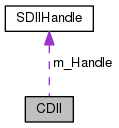#include <corelib/ncbidll.hpp>
 Collaboration diagram for CDll:
Collaboration diagram for CDll:Classes | |
| union | TEntryPoint |
| Entry point – pointer to either a function or a data. More... | |
Public Types | |
| enum | EFlags { fLoadNow = (1<<1) , fLoadLater = (1<<2) , fAutoUnload = (1<<3) , fNoAutoUnload = (1<<4) , fBaseName = (1<<5) , fExactName = (1<<6) , fGlobal = (1<<7) , fLocal = (1<<8) , fDefault = fLoadNow | fNoAutoUnload | fBaseName | fGlobal } |
| General flags. More... | |
| enum | ELoad { eLoadNow = fLoadNow , eLoadLater = fLoadLater } |
| When to load DLL. More... | |
| enum | EAutoUnload { eAutoUnload = fAutoUnload , eNoAutoUnload = fNoAutoUnload } |
| Whether to unload DLL in the destructor. More... | |
| enum | EBasename { eBasename = fBaseName , eExactName = fExactName } |
| Whether to transform the DLL basename. More... | |
| typedef unsigned int | TFlags |
| Binary OR of "EFlags". More... | |
| typedef void(* | FEntryPoint) (char ****Do_Not_Call_This) |
| Fake, uncallable function pointer. More... | |
Public Member Functions | |
| CDll (const string &name, TFlags flags) | |
| Constructor. More... | |
| CDll (const string &name, ELoad when_to_load=eLoadNow, EAutoUnload auto_unload=eNoAutoUnload, EBasename treate_as=eBasename) | |
| Constructor (for backward compatibility). More... | |
| CDll (const string &path, const string &name, TFlags flags) | |
| Constructor. More... | |
| CDll (const string &path, const string &name, ELoad when_to_load=eLoadNow, EAutoUnload auto_unload=eNoAutoUnload, EBasename treate_as=eBasename) | |
| Constructor (for backward compatibility). More... | |
| ~CDll (void) | |
| Destructor. More... | |
| void | Load (void) |
| Load DLL. More... | |
| void | Unload (void) |
| Unload DLL. More... | |
| template<class TFunc > | |
| TFunc | GetEntryPoint_Func (const string &name, TFunc *func) |
| Get DLLs entry point (function). More... | |
| template<class TData > | |
| TData | GetEntryPoint_Data (const string &name, TData *data) |
| Get DLLs entry point (data). More... | |
| TEntryPoint | GetEntryPoint (const string &name) |
| Helper find method for getting a DLLs entry point. More... | |
| const string & | GetName () const |
| Get the name of the DLL file. More... | |
Protected Member Functions | |
| CDll (const CDll &) | |
| Private copy constructor to prohibit copy. More... | |
| CDll & | operator= (const CDll &) |
| Private assignment operator to prohibit assignment. More... | |
Private Member Functions | |
| void | x_ThrowException (const string &what) |
| Helper method to throw exception with system-specific error message. More... | |
| void | x_Init (const string &path, const string &name, TFlags flags) |
| Helper method to initialize object. More... | |
Private Attributes | |
| string | m_Name |
| DLL name. More... | |
| SDllHandle * | m_Handle |
| DLL handle. More... | |
| TFlags | m_Flags |
| Flags. More... | |
Detailed Description
CDll –.
Define class for portable Dll handling.
The DLL name is considered the basename if it does not contain embedded '/', '\', or ':' symbols. Also, in this case, if the DLL name does not start with NCBI_PLUGIN_PREFIX and contain NCBI_PLUGIN_MIN_SUFFIX (and if eExactName flag not passed to the constructor), then it will be automatically transformed according to the following rule: <name> —> NCBI_PLUGIN_PREFIX + <name> + NCBI_PLUGIN_SUFFIX
If the DLL is specified by its basename, then it will be searched (after the transformation described above) in the following locations:
UNIX: 1) the directories that are listed in the LD_LIBRARY_PATH environment variable (analyzed once at the process startup); 2) the directory from which the application loaded; 3) hard-coded (e.g. with `ldconfig' on Linux) paths.
MS Windows: 1) the directory from which the application is loaded; 2) the current directory; 3) the Windows system directory; 4) the Windows directory; 5) the directories that are listed in the PATH environment variable.
NOTE: All methods of this class except the destructor throw exception CCoreException::eDll on error.
Definition at line 106 of file ncbidll.hpp.
The documentation for this class was generated from the following files:
- include/corelib/ncbidll.hpp
- src/corelib/ncbidll.cpp
